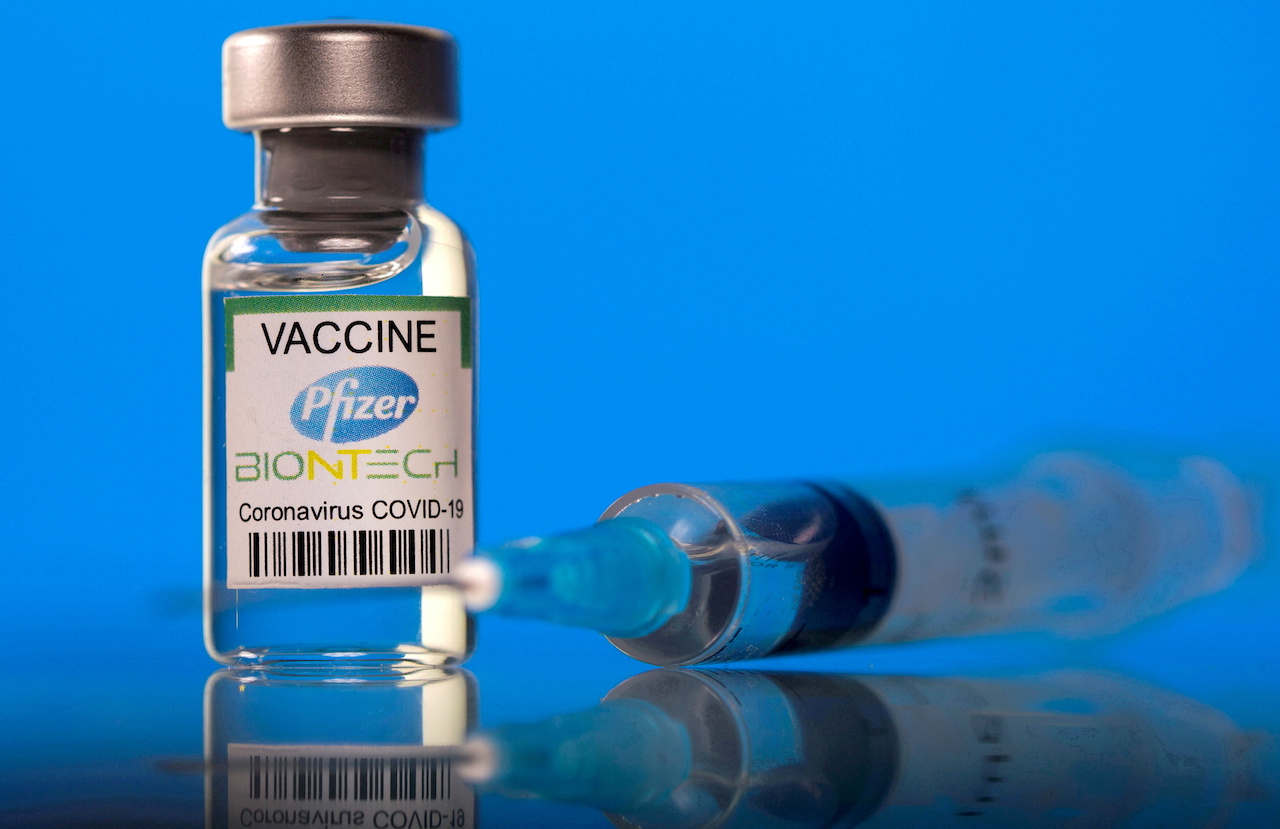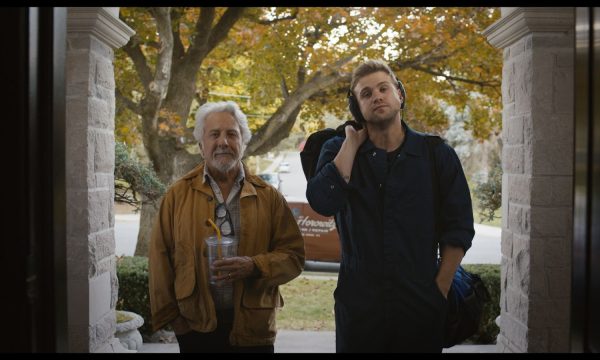Pfizer Inc. and BioNTech SE announced that the U.S. Food and Drug Administration’s (FDA) Vaccines and Related Biological Products Advisory Committee (VRBPAC) voted 17 to 0, with 1 abstention, to recommend the FDA grant Emergency Use Authorization (EUA) for the companies’ COVID-19 vaccine in children 5 to <12 years of age. VRBPAC is made up of independent experts who advise the FDA on scientific and regulatory matters, including the evaluation of vaccine safety and efficacy.
This press release features multimedia. View the full release here: https://www.businesswire.com/news/home/20211026006316/en/
The committee reviewed the totality of scientific evidence shared by the companies, including results from a Phase 2/3 randomized, controlled trial that included ~4,500 children 5 to <12 years of age (2,268 from the original group and 2,379 from the supplemental safety group). Participants in this age group received a two-dose regimen of 10-µg doses administered 21 days apart, one-third of the 30-µg dose used for people 12 years and older. This dose level was carefully selected for use in the trial based on safety, tolerability and immunogenicity data evaluated as part of a dose-ranging study. The Phase 2/3 trial showed a favorable safety profile, robust immune responses and a vaccine efficacy rate of 90.7% in participants without prior SARS-CoV-2 infection, measured from 7 days after the second dose. The Data Monitoring Committee for the study has reviewed the data and has not identified any serious safety concerns related to the vaccine.
“We appreciated the opportunity to present our clinical data demonstrating the safety and high efficacy of our COVID-19 vaccine in children 5 to under 12 years of age,” said Kathrin U. Jansen, Ph.D., Senior Vice President and Head of Vaccine Research & Development, Pfizer. “COVID-19 is an ongoing threat for the more than 28 million young children in this age group in the U.S., as they remain at risk for this infection. About 10% of all weekly U.S. cases occur in children 5 to under 12 years of age with a potential risk of complications. In addition, immunizing children will help to get us closer to herd immunity, with the potential to stem the pandemic sooner. We thank the FDA advisory committee for their review and positive recommendation in support of Emergency Use Authorization to help protect this young population.”
“We are committed to support the ongoing efforts to reduce infections and COVID-19 cases around the world by expanding the population of people protected against COVID-19,” said Özlem Türeci, M.D., Co-founder and Chief Medical Officer of BioNTech. “The clinical data reviewed underline that our vaccine induces a strong immune response in children when Delta was the prevalent strain and thus may contribute to help address this public health crisis.”
The FDA is expected to make its decision in the coming days. If authorized and subsequently recommended by the U.S. Centers for Disease Control and Prevention’s (CDC) Advisory Committee on Immunization Practices (ACIP), the Pfizer-BioNTech COVID-19 Vaccine will be the first COVID-19 vaccine available for use in children 5 to <12 years of age in the U.S. The companies expect to then begin shipping pediatric vaccine doses immediately, as directed by the U.S. government. Eligible U.S. residents will continue to receive the vaccine for free, consistent with the U.S. government’s commitment to free access to COVID-19 vaccines.
Pfizer and BioNTech have submitted requests for authorization of their COVID-19 vaccine in this age group to other regulators around the world, including the European Medicines Agency. Initial data from the other two age cohorts in the ongoing Pfizer-BioNTech clinical trial in children – those 2 to <5 years of age and those 6 months to <2 years of age – are expected as soon as fourth quarter 2021 or early first quarter 2022.
The Pfizer-BioNTech COVID-19 Vaccine, which is based on BioNTech’s proprietary mRNA technology, was developed by both BioNTech and Pfizer. BioNTech is the Marketing Authorization Holder in the United States, the European Union, the United Kingdom, Canada and the holder of emergency use authorizations or equivalents in the United States (jointly with Pfizer) and other countries. Submissions to pursue regulatory approvals in those countries where emergency use authorizations or equivalent were initially granted are planned or ongoing.
U.S. INDICATION & AUTHORIZED USE
HOW IS THE VACCINE GIVEN?
The vaccine will be given as an injection into the muscle.
Primary Series: The vaccine is administered as a 2-dose series, 3 weeks apart. A third dose may be administered at least 4 weeks after the second dose to individuals who are determined to have certain kinds of immunocompromise.
Booster Dose:
- A single booster dose of the vaccine may be administered at least 6 months after completion of a primary series to individuals:
- 65 years of age and older
- 18 through 64 years of age at high risk of severe COVID-19
- 18 through 64 years of age with frequent institutional or occupational exposure to SARS-CoV-2
- A single booster dose of the vaccine may be administered to certain individuals who have completed primary vaccination with a different authorized COVID-19 vaccine. Individuals should check with their healthcare provider regarding eligibility for, and timing of, the booster dose.
WHAT IS THE INDICATION AND AUTHORIZED USE?
The FDA-approved COMIRNATY® (COVID-19 Vaccine, mRNA) and the FDA-authorized Pfizer-BioNTech COVID-19 Vaccine under Emergency Use Authorization (EUA) have the same formulation and can be used interchangeably to provide the COVID-19 primary vaccination series or a booster dose.
COMIRNATY® (COVID-19 Vaccine, mRNA) is an FDA-approved COVID-19 vaccine made by Pfizer for BioNTech.
- It is approved as a 2-dose series for prevention of COVID-19 in individuals 16 years of age and older.
- It is also authorized under EUA to provide:
- a two-dose primary series in individuals 12 through 15 years
- a third primary series dose in individuals 12 years of age and older who have been determined to have certain kinds of immunocompromise
- a single booster dose to the following individuals who have completed a primary series with Pfizer-BioNTech COVID-19 Vaccine or COMIRNATY®:
- 65 years of age and older
- 18 through 64 years of age at high risk of severe COVID-19
- 18 through 64 years of age with frequent institutional or occupational exposure to SARS-CoV-2
- a single booster dose to eligible individuals who have completed primary vaccination with a different authorized COVID-19 vaccine. Booster eligibility and schedule are based on the labeling information of the vaccine used for the primary series.
The Pfizer-BioNTech COVID-19 Vaccine has received EUA from FDA to provide:
- a two-dose primary series in individuals 12 years of age and older
- a third primary series dose for individuals 12 years of age and older who have been determined to have certain kinds of immunocompromise
- a single booster dose to the following individuals who have completed a primary series with Pfizer-BioNTech COVID-19 Vaccine or COMIRNATY®:
- 65 years of age and older
- 18 through 64 years of age at high risk of severe COVID-19
- 18 through 64 years of age with frequent institutional or occupational exposure to SARS-CoV-2
- a single booster dose to eligible individuals who have completed primary vaccination with a different authorized COVID-19 vaccine. Booster eligibility and schedule are based on the labeling information of the vaccine used for the primary series.
EUA Statement
Emergency uses of the vaccine have not been approved or licensed by FDA, but have been authorized by FDA, under an Emergency Use Authorization (EUA) to prevent Coronavirus Disease 2019 (COVID-19) in individuals 12 years of age and older. The emergency uses are only authorized for the duration of the declaration that circumstances exist justifying the authorization of emergency use of the medical product under Section 564(b)(1) of the FD&C Act unless the declaration is terminated or authorization revoked sooner. Please see EUA Fact Sheet at www.cvdvaccine-us.com.
IMPORTANT SAFETY INFORMATION
Individuals should not get the vaccine if they:
- had a severe allergic reaction after a previous dose of this vaccine
- had a severe allergic reaction to any ingredient of this vaccine
Individuals should tell the vaccination provider about all of their medical conditions, including if they:
- have any allergies
- have had myocarditis (inflammation of the heart muscle) or pericarditis (inflammation of the lining outside the heart)
- have a fever
- have a bleeding disorder or are on a blood thinner
- are immunocompromised or are on a medicine that affects the immune system
- are pregnant, plan to become pregnant, or are breastfeeding
- have received another COVID-19 vaccine
- have ever fainted in association with an injection
The vaccine may not protect everyone.
Side effects reported with the vaccine include:
- There is a remote chance that the vaccine could cause a severe allergic reaction
- A severe allergic reaction would usually occur within a few minutes to one hour after getting a dose of the vaccine. For this reason, vaccination providers may ask individuals to stay at the place where they received the vaccine for monitoring after vaccination
- Signs of a severe allergic reaction can include difficulty breathing, swelling of the face and throat, a fast heartbeat, a bad rash all over the body, dizziness, and weakness
- If an individual experiences a severe allergic reaction, they should call 9-1-1 or go to the nearest hospital
- Myocarditis (inflammation of the heart muscle) and pericarditis (inflammation of the lining outside the heart) have occurred in some people who have received the vaccine. In most of these people, symptoms began within a few days following receipt of the second dose of the vaccine. The chance of having this occur is very low. Individuals should seek medical attention right away if they have any of the following symptoms after receiving the vaccine:
- chest pain
- shortness of breath
- feelings of having a fast-beating, fluttering, or pounding heart
- Side effects that have been reported with the vaccine include:
- severe allergic reactions; non-severe allergic reactions such as rash, itching, hives, or swelling of the face; myocarditis (inflammation of the heart muscle); pericarditis (inflammation of the lining outside the heart); injection site pain; tiredness; headache; muscle pain; chills; joint pain; fever; injection site swelling; injection site redness; nausea; feeling unwell; swollen lymph nodes (lymphadenopathy); decreased appetite; diarrhea; vomiting; arm pain; fainting in association with injection of the vaccine
- These may not be all the possible side effects of the vaccine. Serious and unexpected side effects may occur. The possible side effects of the vaccine are still being studied in clinical trials. Call the vaccination provider or healthcare provider about bothersome side effects or side effects that do not go away
Data on administration of this vaccine at the same time as other vaccines has not yet been submitted to FDA. Individuals considering receiving this vaccine with other vaccines, should discuss their options with their healthcare provider.
Patients should always ask their healthcare providers for medical advice about adverse events. Individuals are encouraged to report negative side effects of vaccines to the US Food and Drug Administration (FDA) and the Centers for Disease Control and Prevention (CDC). Visit http://www.vaers.hhs.gov or call 1‐800‐822‐7967. In addition, side effects can be reported to Pfizer Inc. at www.pfizersafetyreporting.com or by calling 1-800-438-1985.
Please click here for full Prescribing Information (16+ years of age). Please click here for Fact Sheet for Vaccination Providers (12+ years of age). Please click here for the Recipients and Caregivers Fact Sheet (12+ years of age).














